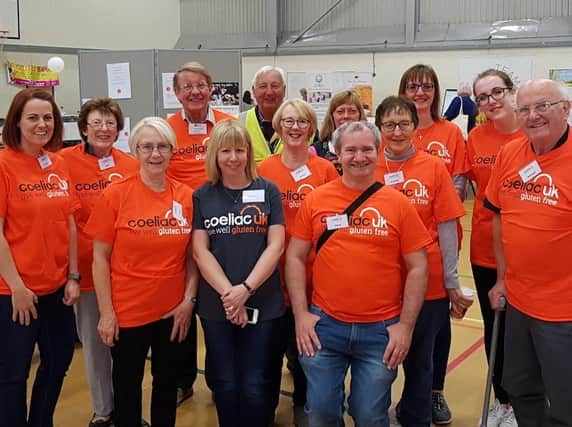Why this Preston woman was given a new life after being diagnosed with coeliac disease


Jenny Doran felt like her feet “touched the floor” when she stopped eating gluten for the first time.
Having been underweight, anaemic and suffering with mouth ulcers all her life, Jenny was almost 40 when she was diagnosed with coeliac disease three decades ago.
Advertisement
Hide AdAdvertisement
Hide AdWhen she stopped eating gluten, Jenny says it was a wonderful relief because she had never felt as healthy and well.
Jenny, who is now 70, said: “When you stop eating gluten, you feel free. I felt like my feet touched the floor and I felt stable. It enabled me to have more energy and was like a new life really.”
Jenny’s mouth ulcers were so severe she often had to turn to medication for relief.
She says: “I couldn’t speak and my neck would swell up.
“I used to have penicillin injections because my mouth ulcers used to re-infect themselves.”
Advertisement
Hide AdAdvertisement
Hide AdAs Jenny, of Longridge, was diagnosed, she realised the “family funny stomach” meant both her dad and brother were also suffering from the disease.
Jenny says: “When I went to be diagnosed and they told me, I realised what was a family problem with my brother, and possibly my dad, wasn’t really just a family funny stomach.
“I thought it was normal because that’s how we felt.”
Two hours after eating gluten, Jenny is violently sick with diarrhoea and has head sweats. Jenny says: “I’m desperate to get home or to get to a private place to a bathroom.
“I used to always walk around with a carrier bag if I was going to a theatre because if I was in the middle of the row, I’d think ‘they said it was gluten-free but is it?’ and I’d go into a hot sweat.”
Advertisement
Hide AdAdvertisement
Hide AdBut over the past few decades, Jenny believes there has been an improvement because people are more careful with food.
She says: “I only used to eat at a couple of local restaurants for years because they knew me and I knew them, but it’s opened up now and I tend to go to accredited places.
“It’s never been better, compared to what it was like when I was first diagnosed because I just remember walking around the supermarket not knowing what to eat.”
She adds: “I hadn’t been to one restaurant for 30 years because they put flour on the fish and insisted they hadn’t.
Advertisement
Hide AdAdvertisement
Hide Ad“I drove home and had to pull over because I was being violently sick.”
Jenny says she would sooner starve than eat anywhere she wasn’t sure about.
She says: “Many people don’t realise the complications and long term damage to your body and your bones if you eat gluten.”
Tragically, Jenny had a lot of miscarriages and a baby born with spina bifida who died.
Advertisement
Hide AdAdvertisement
Hide AdIt’s not known what causes spina bifida, but a lack of folic acid before and in the early stages of pregnancy is a significant risk factor and this is a vitamin those who have coeliac disease have a deficiency of.
Jenny is calling for an easier diagnosis because she says at the moment people have to eat gluten for six weeks to track symptoms and it makes them ill.
She would also like hospitals to join Coeliac UK’s accreditation scheme and to be trained in catering for coeliac’s.
Jenny says: “I dread going to hospital because they don’t take it seriously and aren’t able to provide food, generally around the country.”
Advertisement
Hide AdAdvertisement
Hide AdJenny is a member of Preston and East Lancashire’s local groups from Coeliac UK.
The team arranges Preston’s gluten-free food fair, returning to Preston College on April 4 from 10.30am until 2.30pm. The event will bring together more than 20 different producers of gluten-free food and drink.
Many of them are independent businesses from the North West, making gluten-free beer, bread and pies.
Read Megan Haigh's story here.
Comment Guidelines
National World encourages reader discussion on our stories. User feedback, insights and back-and-forth exchanges add a rich layer of context to reporting. Please review our Community Guidelines before commenting.